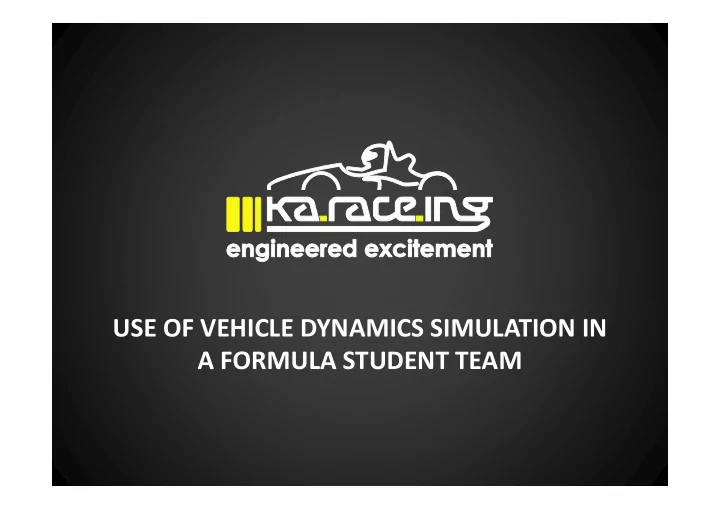

USE OF VEHICLE DYNAMICS SIMULATION IN A FORMULA STUDENT TEAM
CONTENT. INTRODUCTION FORMULA 1. STUDENT INTRODUCTION 2. KA-RACEING 3. 3. SIMULATION MODELS SIMULATION MODELS 4. CONCEPT DECISIONS 5. SUSPENSION TUNING CONTROL SYSTEM 6. VERIFICATION
INTRODUCTION FORMULA STUDENT
INTRODUCTION FORMULA STUDENT • Design competition with an race car theme • 11 events in 10 countries and on 5 continents per year • Formula Student teams in Formula Student teams in over 50 different countries • Over 70 teams in Germany
INTRODUCTION FORMULA STUDENT • 8 disciplines in an event – 5 dynamic disciplines – 3 static disciplines • Goal is to score 1000 points
INTRODUCTION KA-RACEING
INTRODUCTION KA-RACEING • Formula Student Team of the Karlsruhe Institute of Technology (KIT) • Founded in 2006, first car in 2007 • Since 2010 every year one electric and one combustion car One team, two cars! 7
INTRODUCTION KA-RACEING • In 2014: – 55 Students – 2 cars – 5 events
INTRODUCTION KA-RACEING KIT14c • 199 kg • Self-developed combustion engine • Drag Reduction System • 10“ tires on CFRP rims • Hybrid Chassis
INTRODUCTION KA-RACEING KIT14e • 211 kg • Self-developed electric engines • Drag Reduction System • Monocoque • 10“ tires on CFRP rims • „Active Yaw Control“ and „Traction Control“
SIMULATION MODELS
SIMULATION MODELS Tire Model • 2007 – 2013: Magic Formula – Pro: • very good for steady-state analysis • low computing time • low computing time • available Fitting Software – Contra: • over 160 parameters • often problems with oscillations • hard to properly fit transient coefficients • no road uneveness • no thermal model
SIMULATION MODELS Tire Model Fz Slip Vel. 1. Order 1. Order Wheel Load Dynamics • Since 2014: KA-RaceTire Model Model Model Scale Factor Slip Camber TMEasy Camber Model Fx Fy Fx Fy Output 13
SIMULATION MODELS • Electric Powertrain • Simulink Model of Electric Powertrain containing: – Engine model with efficiency map – Battery model with efficiency factors – Recuperation considered – Control Systems embedded Control Systems embedded
SIMULATION MODELS • Aerodynamics • Aerodynamic coefficients as function of ride height, roll and pitch angle • Model for DRS actuation
CONCEPT DECISIONS
CONCEPT DECISIONS • Lap-Time Simulation • Lap-Time Simulation suitable for basic concept decisions • Driver handling the car close to its physical limits • Comparison of lap-times sensitivy of lap-time on different parameters parameters
CONCEPT DECISIONS • Powertrain Concept Concept 1 Concept 2 Concept 3 2WD, very 4WD, high 4WD, high • Concepts different in: light car inertia, weight, medium medium – Mass weight inertia, high – Intertia torque Acceleration Acceleration 100 % 100 % 81 % 81 % 78 % 78 % – Number of driven wheels – Number of driven wheels – Center of Gravity – Engine Power Skid-Pad 100 % 104 % 106 % Autocross 100 % 88 % 87 % Endurance 100 % 88 % 87 %
CONCEPT DECISIONS • Aerodynamics Concept • Aerodynamics in general Without Aero With Aero Cz - 0,2 % 100 % Cx 31,3 % 100 % Lap-Time Skid-Pad 103 % 100 % Lap-Time Autocross 114,2 % 100 %
CONCEPT DECISIONS • Aerodynamics Concept • DRS Concept
SUSPENSION TUNING
SUSPENSION TUNING • Sensitivity Studies with Open-Loop-Maneuvers – Steady-State Cornering – Steer-Step – Sinus-Sweep – Accelerating
SUSPENSION TUNING • Parameter Studies to: – Learn about influences of parameters on vehicle dynamics – Know which parameter to change – Save Test Time!
CONTROL SYSTEMS VERIFICATION
CONTROL SYSTEMS VERIFICATION • Control Systems on electric since KIT12e – KIT12e: Traction Control – KIT13e & KIT14e: Traction Control and Active Yaw Control
CONTROL SYSTEMS VERIFICATION • Verification of Control Systems in CarMaker: – Do the Control Systems work? – How is the interaction? – Is there any strange behaviour in certain maneuvers? – Do the Control Systems work in all disciplines? • Validation and Parameter Tuning on track!
Thank you!
Recommend
More recommend